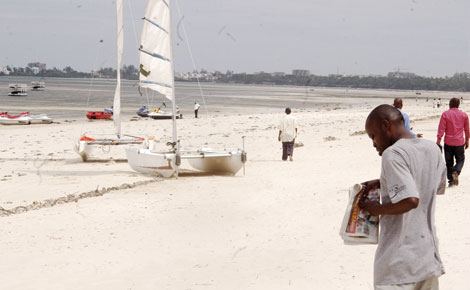 |
|
Front view of a Beach in North Coast. Many foreign tourists left after travel advisories issued by the US, UK, Australia and France. [PHOTO: OMONDI ONYANGO/STANDARD] |
Nairobi, Kenya: The country’s battered hoteliers Wednesday met President Uhuru Kenyatta, as the Government makes frantic, but late efforts to salvage the industry from total collapse.
Government officials, the Kenya Tourist Board and governors from the coastal region also attended the meeting at Harambee House, the Office of the President.
The meeting agreed on the need to embark on a recovery strategy immediately. A follow up meeting between the president and industry players is expected to take place tomorrow (Friday) morning, with the private sector expected to table proposals on how to go about resuscitating the country’s second largest foreign exchange earner.
Major losses suffered
The effort by the State comes on the back of major losses suffered by the industry over the last one week.
Hoteliers say they have lost over Sh650 million in just a few days following the escalation of travel advisories by key tourist source markets. It is feared that the losses could go as high as Sh5 billion in the coming weeks if the situation does not improve.
Players estimate that the numbers – arrivals and earnings – since the beginning of the year to date could have dipped by as much as 40 per cent compared to last year. There were 255 000 tourists to Kenya in the first quarter of last year, which was in itself a bad year for tourism as it was an election year.
“Tourism is in dire straits… if we do not do a recovery now, it is sunk and we will have to do a lot of work to get it where it was,” explained Fred Kaigua, the chief executive Kenya Association of Tour Operators (KATO).
“We are currently in deep talks with the Government on how to get the industry back on track.”
The sector crisis comes weeks before the high season. The season runs from July through to October, when the country gets most of its tourism revenues. The season also coincides with the Wildebeest Migration in Masai Mara, a major attraction.
Tens of thousands of hotel staff and employers along the tourism value chain including suppliers are also staring at layoffs as the country’s second largest foreign exchange grinds to a near halt.
Hoteliers say they are yet to start laying off staff, but note that it is inevitable if things do not improve.
Mike Macharia chief executive Kenya Association of Hotel Keepers and Caterers said hoteliers have lost hundreds of millions of shillings of confirmed business in the less than one week since the advisories were issued.
He added that there is risk of losing a further Sh5 billion if the situation does not change in the coming months.
“This has come at a bad time given that it is the pre-high season and the high season and without doubt, the sector is likely to take a direct blow if the situation remains as it is,” said Macharia.
“It is not just the coastal tourism that has been affected but the advisories have affected other tourism circuits that have nothing to do with the coast. Nairobi has for instance lost $400 000 in the few days owing to the advisories. There has been a ripple effect and we have seen it affecting areas that have nothing to do with the coast.”
Though Macharia said hoteliers are yet to start laying off staff due to low occupancy levels at their facilities, he noted that it was inevitable if the situation does not improve. Already hotel owners are asking staff to take their annual leaves now in a bid to cut on costs.
“We have not gotten there yet and we are hoping the advisories are reversed,” he said.
Key commodity buyers
The tourism industry is estimated to employ between 300,000 and 350,000 directly and indirectly, but it is also a key buyer for commodities produced locally.
Players note that this year could be the worse than 2008, when the country was recovering from the post-election violence when tourists shunned Kenya.
Senior state officials, including the president reacted angrily to the travel bans, almost telling off the West and North American countries that make up the bulk of traditional tourist source markets.
But there have been queries as to whether Chinese tourists can save Kenya’s ailing tourism sector.
According to the Statistics by the ministry in charge of tourism, Chinese visitors to Kenya declined to 37,062 in 2013, up from 41,303 in 2012 (which presents a 10 per cent decline).
In the year 2013, the industry earned Kenya Sh93.97 billion compared to Sh96.2 billion recorded in the previous year (2012), 2011 figures stood at Sh97.9 billion.
 The Standard Group Plc is a multi-media organization with investments in media
platforms spanning newspaper print operations, television, radio broadcasting,
digital and online services. The Standard Group is recognized as a leading
multi-media house in Kenya with a key influence in matters of national and
international interest.
The Standard Group Plc is a multi-media organization with investments in media
platforms spanning newspaper print operations, television, radio broadcasting,
digital and online services. The Standard Group is recognized as a leading
multi-media house in Kenya with a key influence in matters of national and
international interest.
 The Standard Group Plc is a multi-media organization with investments in media
platforms spanning newspaper print operations, television, radio broadcasting,
digital and online services. The Standard Group is recognized as a leading
multi-media house in Kenya with a key influence in matters of national and
international interest.
The Standard Group Plc is a multi-media organization with investments in media
platforms spanning newspaper print operations, television, radio broadcasting,
digital and online services. The Standard Group is recognized as a leading
multi-media house in Kenya with a key influence in matters of national and
international interest.










